The educational materials listed on this page are about Pest Management.
Producers must control a wide range of insect, weed and disease pests that can disrupt the healthy growth of crops. Given increasing resistance to chemical control methods (including organic pesticides and natural pesticides) farmers are increasingly adopting multifaceted strategies to keep pests at bay. These strategies include the biological controls and cultural controls featured in integrated pest management (IPM) as well as traditional chemical and physical controls. Integrated pest management (IPM) uses a range of ecological strategies to prevent pest damage and resorts to the use of pesticides only when monitoring indicates such action is required to avoid economic loss. Whole farm pest management systems build upon the biological pest control approach of IPM systems by integrating ecological pest management practices into all aspects of crop production. Soil organic matter and nutrient management, tillage, crop rotation and field boundaries, borders and buffers all play an important role in both increasing crop pest resistance and reducing pest pressures. Weed control is a challenge on all types of farm operations. A successful weed management plan will vary depending on the type of operation and whether it is conventional or organic. Helpful practices in an integrated weed management plan may include chemical weed control (conventional and organic herbicides), the use of mulches (living mulch or cover crops, killed mulches, plastic mulch), tillage or cultivation, crop rotation, and more novel techniques such as soil solarization or using geese or goats for weed control.
SARE’s Manage Insects on your Farm addresses the principles of ecological pest management. A Whole Farm Approach to Managing Pests provides tips for designing whole-farm pest management solutions. Managing Cover Crops Profitably, Crop Rotations on Organic Farms and Steel in the Field also provide helpful insights into the roles cover crops, rotations and tillage can play in pest management.
Farmers need to understand disease management on the farm to employ effective plant disease control methods. Becoming familiar with crop diseases means utilizing myriad effective strategies to prevent and control diseases. Various integrated management practices control the spread of disease including biological control, physical control and cultural control. Chemical control may include synthetic fungicides, while organic producers rely on an organic fungicide or other natural fungicide to aid in crop protection. For example, disease management in tomatoes, which are susceptible to many diseases, includes the use of resistant cultivars, sanitation, sound cultural practices and fungicide for tomatoes. While there are many chemicals available for different crops, such as fungicide for grass or soybean fungicides, holistic or integrated approaches to disease management are also important tools for effective plant disease control. Key practices include integrated crop and livestock systems, crop rotation, utilizing disease resistant varieties and cultivars, cultural control, biological control, physical control, chemical control, and prevention.
Showing 1-20 of 35 results
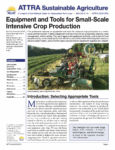
Equipment and Tools for Small-Scale Intensive Crop Production Guide and Videos
This publication focuses on equipment and tools for intensive crop production on a small-scale commercial farm. It details equipment and hand tools for soil preparation, planting, weed management, and harvesting. The use of appropriate equipment and tools, both in terms of size and practicality, can increase production efficiency and profits while minimizing disturbance to soil […]
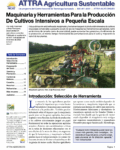
Maquinaria y Herramientas Para la Producción De Cultivos Intensivos a Pequeña Escala
Resumen Esta publicación se centra en equipos y herramientas para la producción intensiva de cultivos en una granja comercial a pequeña escala. Detalla equipos y herramientas manuales para la preparación del suelo, la siembra, el manejo de malezas y la cosecha. El uso de equipos y herramientas apropiados, tanto en términos de tamaño como de […]
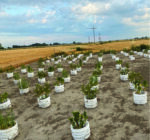
Idaho Student Researchers Work to Eradicate Pale Cyst Nematode
When the pale cyst nematode, Globodera pallida, was discovered in southeastern Idaho in 2006, potato exports in Idaho and the United States were severely impacted. The nematode, which can devastate a potato crop, is a quarantine pest regulated by U.S. Department of Agriculture’s Animal and Plant Health Inspection Service. The Idaho infestation is found within […]

Ungulates: Hawaii’s Hooved Problem
Hooved mammals – ungulates in scientific parlance – aren’t native to the archipelago but have been brought to the islands over the past centuries. Now, population explosions of wild pigs, feral sheep and goats, big-horned mouflon sheep and axis and black-tailed deer are altering ecosystems, affecting fisheries, imperiling agriculture and causing economic harm. “If you […]

Reducing Weeds by 80% Using Solarization
La Buena Tierra farmer Maria de los Angeles Carrillo (Angeles) is delighted that her interest in researching a non-chemical pest management practice has reduced her weeds by 80%. Coquillo (nutgrass) was the exception and even that stubborn grass has been reduced greatly and grows weaker roots. Lab tests also demonstrated reduced Verticillium wilt in the […]

Playing Pest Friends
At their annual meeting this summer, Western SARE state coordinators came together and played an educational board game about managing pests. Their experience was similar to other groups who indicate that they learn more by doing than listening. Jason Thomas and Grant Loomis, extension educators at the University of Idaho, received a Western SARE grant […]
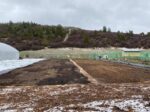
Farmers Test Whether Cardboard Can Keep Bindweed at Bay
Bindweed can be the bane of farmers’ existence. The climbing vine spreads easily by seed and rigorous root system, choking off crops and other plants along the way. “Even when we till in the spring, we spend a huge amount of time hand weeding throughout the season to manage bindweed,” explained Jonah Sloven, who grows […]
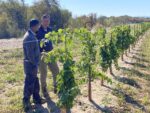
Reasons to Like Wine
Reasons to like wine Number 462: It can be good for New Mexico’s native bees and other pollinators. Even though grapevines are largely self pollinating and don’t need insects like bees or butterflies to produce fruit, vineyards themselves can provide habitat for native pollinators and other insect species, benefiting both the grower and the environment. […]
Video: Testing Cover Crops in New Mexico Vineyards
Watch our newest video describing this Western SARE funded work - Miranda Kersten, IPM Program and Gill Giese, Viticulture of New Mexico State University describe their work promoting putting cover crops in vineyards. The research will demonstrate how to ensure the cover crops successfully grow and flower so that they attract pollinators and provide additional […]

Cheatgrass-Eating Sheep
Wildfires in the West are inevitable and part of a natural, necessary ecological cycle, but invasive grasses like cheatgrass can make fires burn hotter, spread farther and cause more destruction. So, across the West, researchers, range managers, cattle ranchers and others are looking for ways to economically control cheatgrass and other invasive grasses on millions […]
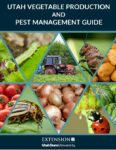
Utah Vegetable Production & Pest Management Guide
Partially funded by Western SARE, the Utah Vegetable Production and Pest Management Guide is inclusive to all growers, whether commercial or hobbyist. Although content is specific to Utah, most content applies to the Intermountain West states. The book includes twelve chapters of specific production methods and comprehensive pest and treatment recommendations for crops representing brassicas, […]
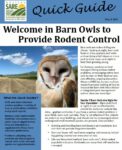
WSARE Quick Guide: Welcome in Barn Owls to Provide Rodent Control
Quick guide to encouraging barn owls to provide rodent control.
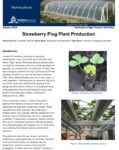
Specialty Crop Production in High Tunnels
A three-year, SARE-funded project focused on developing fruit and vegetable systems suited to high tunnel production in the high-elevation arid Intermountain West. Successful systems were developed for lettuce, tomato, squash and strawberry production. Work with brambles showed that methods suited to other regions were not locally appropriate. The following Utah State University Cooperative Extension fact […]
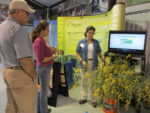
A Sunn Hemp Cover Crop for Soil Health and Nematode Management
These University of Hawaii fact sheets and virtual field day explain how to use sunn hemp as a cover crop to control weeds, nematodes and other pests, add soil nutrients, prevent erosion, and contribute to a more robust and complex community of beneficial nematodes. Available fact sheets include:
Sustainable Agriculture Farming Systems Project
Public concerns regarding pesticide misuse, food safety, water use and contamination, and depletion of non-renewable resources have motivated the reevaluation of some of the practices of conventional agriculture and the exploration of alternative, more sustainable approaches to growing food. In 1988, the Sustainable Agriculture Farming Systems (SAFS) project was established at the University of California’s […]
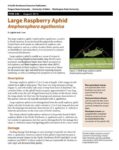
Large Raspberry Aphid
Large raspberry aphid is notable as a vector of viruses in Rubus, including Raspberry leaf mottle virus (RLMV, semi-persistent) and Raspberry latent virus (RpLV, persistent) in red raspberry, and Black raspberry necrosis virus (BRNV, non-persistent) in black raspberry. These viruses are to blame for decreased cane vigor and field decline requiring frequent replanting, as well […]
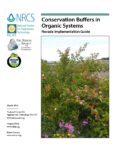
Conservation Buffers in Organic Systems: Nevada
This is a collaborative project to build the capacity of conservation professionals to assist organic and transitional farmers in planning and implementing conservation practices through the Environmental Quality Incentives Program Organic Initiative. This guide is part of a series of guides created by Oregon Tilth for use by NRCS staff in the Western Region. Conservation Buffers provides […]
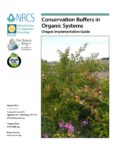
Conservation Buffers in Organic Systems: Oregon
This is a collaborative project to build the capacity of conservation professionals to assist organic and transitional farmers in planning and implementing conservation practices through the Environmental Quality Incentives Program Organic Initiative. This guide is part of a series of guides created by Oregon Tilth for use by NRCS staff in the Western Region. Conservation Buffers provides […]
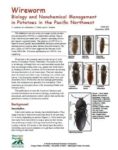
Wireworm Biology and Nonchemical Management in Potatoes
This bulletin is one of a series on organic potato production developed by OSPUD, a collaboration among Oregon State University personnel and 11 farmers operating diversified organic vegetable farms. The purpose of OSPUD is to improve potato quality and profitability through a participatory learning process and on-farm, farmer-directed research. The first two years of OSPUD […]
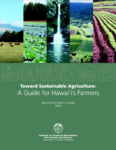
A Guide for Hawai’i’s Farmers
This guide was developed to assist new farmers in tropical small-island settings by providing a distillation of expert information on sustainable agriculture principles, agroecology, crop production, animal production, agroforestry and marketing.